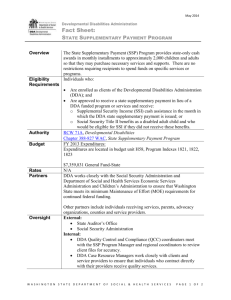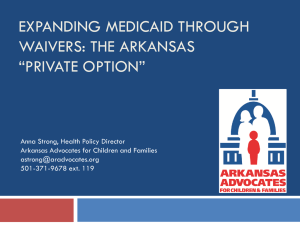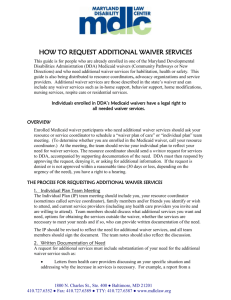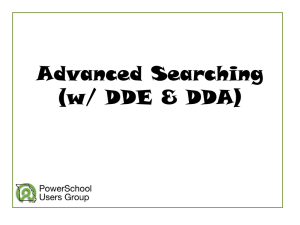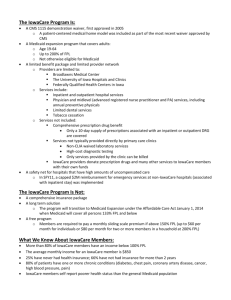DDA Medicaid Waiver Services
advertisement
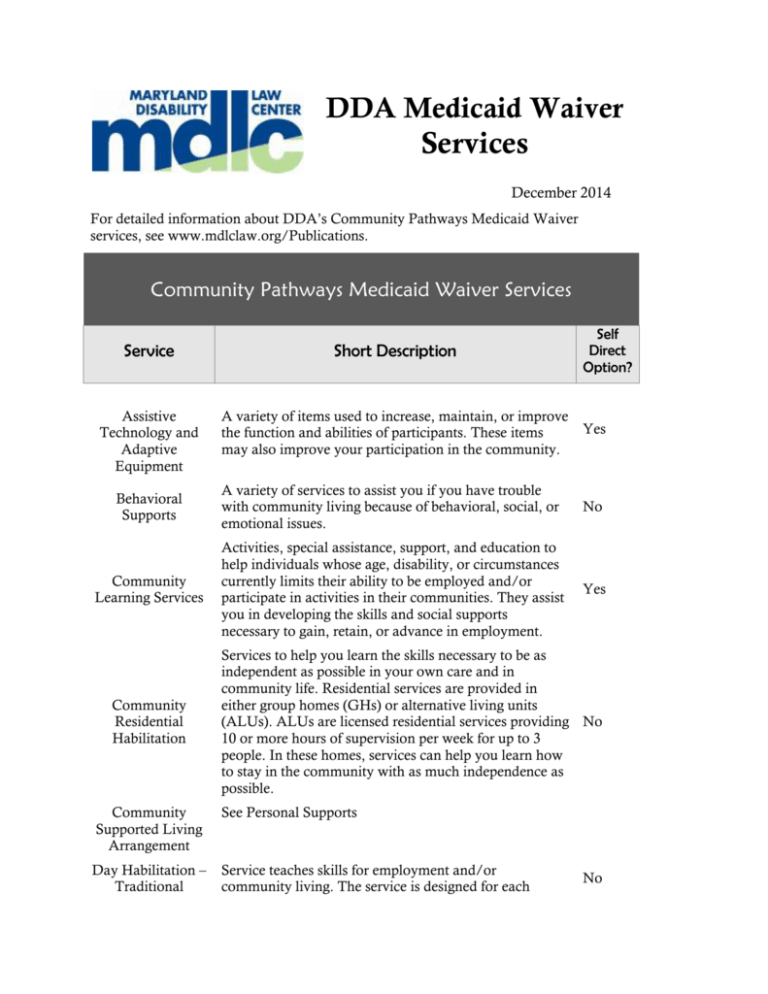
DDA Medicaid Waiver Services December 2014 For detailed information about DDA’s Community Pathways Medicaid Waiver services, see www.mdlclaw.org/Publications. Community Pathways Medicaid Waiver Services Self Direct Option? Service Short Description Assistive Technology and Adaptive Equipment A variety of items used to increase, maintain, or improve the function and abilities of participants. These items may also improve your participation in the community. Yes Behavioral Supports A variety of services to assist you if you have trouble with community living because of behavioral, social, or emotional issues. No Community Learning Services Activities, special assistance, support, and education to help individuals whose age, disability, or circumstances currently limits their ability to be employed and/or participate in activities in their communities. They assist you in developing the skills and social supports necessary to gain, retain, or advance in employment. Yes Community Residential Habilitation Services to help you learn the skills necessary to be as independent as possible in your own care and in community life. Residential services are provided in either group homes (GHs) or alternative living units (ALUs). ALUs are licensed residential services providing No 10 or more hours of supervision per week for up to 3 people. In these homes, services can help you learn how to stay in the community with as much independence as possible. Community Supported Living Arrangement See Personal Supports Day Habilitation – Traditional Service teaches skills for employment and/or community living. The service is designed for each No individual and his or her goals for employment. You will take part in activities in places other than you home for the majority of the day. Employment Discovery and Customization Services help access employment or explore the possibilities and impact of work. Environmental Accessibility Adaptations Home modifications or devices connected to the home. They help you function more independently and to create a safer, healthier environment. Yes Environmental Assessment An on-site evaluation of your primary residence to determine if environmental adaptations/modifications or assistive devices/equipment may be necessary. No Family and Individual Support Services Assistance provided to enable your participation in the community. They make use of resources available in the community while, at the same time, building on existing support network. Yes Live-In Caregiver Rent Money for a personal caregiver who is not related to you. Yes Medical Day Care A group program that provides health, social and related support services. You can receive medical care during the day in a community-based setting offering individuals an alternative to nursing facility care. No Personal Supports Personal supports are hands-on assistance (actually performing a task for you) or reminding you to perform a task. These supports are provided in your own home, family home, in the community, and/or at a work site. Yes Respite Respite is a short-term relief service provided when your regular caregiver is absent or needs a break. The service is provided in your home and/or community settings to meet planned or emergency situations, giving caregivers a time free from their role as care provider. Yes Shared Living An arrangement in which an individual, couple or a family in the community share life's experiences and their home with you. It emphasizes the long-term sharing of lives, forming of caring households, and close personal relationships between you and support person(s). Yes Support Brokerage Yes Information and assistance to support self-direction. If you choose self-direction, you will need to coordinate your service package with a support broker. It is a service Yes that assists you and your family in making informed decisions about what service design and delivery will work best and is consistent with your needs. Supported employment is employment in a work place in the community where the majority of individuals do not have disabilities. The services are designed to assist you with accessing and maintaining paid employment in the community. Yes One-time set-up expenses if you are moving from an institution or a provider setting to a living arrangement in a private residence where you will be responsible for Transition Services your own living expenses or a different provider setting. Allowable expenses are those necessary to set up a basic household. Yes Transportation Services are designed to enhance a person’s ability to access community activities based on needs identified in the participant’s individual plan. Services should increase independence and reduce the level of service need. Yes Vehicle Modifications Vehicle modification services enable you to achieve employment goals and to live successfully in the community when other options are not available from natural supports or the community or covered by the program. Vehicle modifications do not include the purchase of new or used vehicles, general vehicle maintenance or repair, state inspections, insurance, gasoline, fines, tickets, or the purchase of warranties. partial Supported Employment Necessity Criteria: While your services should be what you want, they must also be what you need. Other than Environmental Assessments and to some degree, Behavior Supports, DDA has no formal assessment criteria or standards for obtaining particular Medicaid waiver services. Your team will determine your needs. However, when appropriate, use professional assessments of need or use other records to document your needs. You or a family member or caregiver can also document your needs. Example: If you need physical supports, count the number of times each day that you need help with each activity of daily living (transfer, meal preparation, bathing, etc.) and describe the support you need. Example: If you need more intensive personal or behavioral supports, say how often you need supports and describe what happens when you don’t have what you need. Explain why the added supports would help you to become more independent. For example, you could learn new skills, get a new job, find better activities or cope with stress and have a calmer life. Self-Directed Services: You can hire your own staff and purchase your own services if you choose to self-direct your services. If you self-direct, you will have help from a support broker and fiscal intermediary service as well as your resource coordinator. You and your team will determine what services you need and can afford with your budget. If you don’t self-direct, you can hire provider agencies to deliver your services. You can choose to self-direct some of your services and hire provider agencies for other services. Right to Choose a Provider: Federal Medicaid regulations give you the right to choose from all available DDA provider agencies for each service you need. If you need more than one service you can choose different service providers for each service or, if a single provider delivers all of the services you need, you may choose to have a single provider for multiple services. Inability to find a Provider: If you cannot find a provider due to an inaccurate needs assessment, or “matrix” score, you have the right to request a Medicaid Fair Hearing. “Employment First”: DDA’s policy is, “Employment will be the ‘first’ option considered for all people of working age who receive DDA services.” Medicaid waiver employment services can include staff support to help you work or learn job skills. This does not mean that you must be employed to receive DDA services; it just means that you and your team should consider whether employment is best for you. Some provider agencies still “In the best of situations, sheltered operate sheltered workshops that environments, segregated work, and pay less than minimum wage. the sub-minimum wage do not truly People rarely move from sheltered provide a meaningful experience for workshops to jobs in workplaces workers with disabilities. Workshop with people without disabilities. tasks are often menial and repetitive, You can always choose to move to the environments can be isolating, and a new provider agency or selfthe pay is often well below the federal direct your services if you are not minimum wage. In the worst situations, happy with your current services the segregated and sheltered nature of and opportunities. the lives of workers with disabilities leaves them vulnerable to severe abuse To learn more about the impact of and neglect.”1 earnings on your public benefits and Medical Assistance eligibility, ask your resource coordinator. As your earned income grows, you can ask about the Social Security Administration’s Ticket to Work program and “Medicaid Buy-In.” See MDLC’s web site at www.mdlclaw.org, click on “Publications” and scroll down to see “Social Security.” For more information about applying for or accessing DDA services, see MDLC’s web site at www.mdlclaw.org. For advice or technical assistance, call 410-727-6352, extension 0 and ask for intake. 1 National Disability Rights Network, Segregated and Exploited, a Call for Action: The Failure of the Disability Service System to Provide Quality Work, January 2011, http://www.ndrn.org/images/Documents/Resources/Publications/Reports/Segregated-and-Exploited.pdf (as of March 9, 2012)
